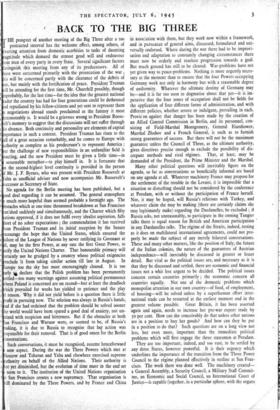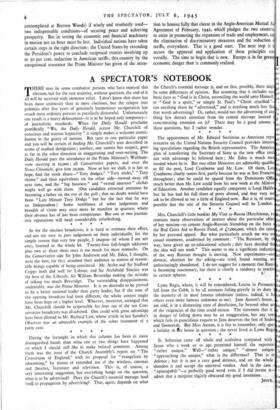BACK TO THE BIG THREE
HE prospect of another meeting of the Big Three after a too protracted interval has the welcome effect, among others, of iverting attention from domestic acerbities to tasks of daunting agnitude which demand the utmost good will and endeavour om men of every party in every State. Several significant factors istinguish this meeting from any of its predecessors. All of ose were concerned primarily with the prosecution of the war , is will be concerned partly with the clearance of the debris of ar, but mainly with the fortification of peace. President Truman ill be attending for the first time, Mr. Churchill possibly, though probably, for the last time—for the idea that the greatest national ader the country has had for four generations could be dethroned nd repudiated by his fellow-citizens and yet sent to represent them negotiations abroad stands proclaimed as the fantasy it most emonstrably is. It would be a grievous wrong to President Roose- elt's memory to suggest that the discussions will not suffer through is absence. Both continuity and personality are elements of capital portance in such a context. President Truman has risen to the all of a great occasion remarkably, and he comes to Europe with uthority as complete as his predecessor's to represent America ; ut the challenge of new responsibilities in an unfamiliar field is xacting, and the new President must be given a little time—in seasonable metaphor—to play himself in. It is fortunate that n the second-highest level continuity is provided in the person • f Mr. J. F. Byrnes, who was present with President Roosevelt at 'alta as unofficial adviser and now accompanies Mr. Roosevelt's uccessor as Secretary of State.
No agenda for the Berlin meeting has been published, but a ood deal regarding it can be assumed. The general atmosphere much more hopeful than seemed probable a fortnight ago. The bstacies which at one time threatened breakdown at San Francisco adshed suddenly and simultaneously, and the Charter which fifty ations approved, if it does not fulfil every idealist aspiration, falls hort of no sober expectations ; the commendation it has received rom President Truman and its initial reception by the Senate ncourage the hope that the United States, which ensured the ailure of the League of Nations by never ratifying its Covenant at 11, may be the first Power, at any rate the first Great Power, to atify the United Nations Charter. That honourable primacy will ertainly not be grudged by a country whose political exigencies reclude It from taking similar action till late in August. In urope too the sky has most encouragingly cleared. It is too arty declare that the Polish problem has been permanently ettled—too many warnings against assuming political permanence here Poland is concerned are on record—but at least the deadlock 'hich prevailed for weeks has yielded to patience and the play f reason. Why it did not yield before is a question there is little rofit in pursuing now. The solution was always in Russia's hands, nd if she had ordained that the problem should be solved sooner he world would have been spared a good deal of anxiety, not un- • xed with suspicion and bitterness. But if the obstacles at both .an Francisco and Warsaw were, or seemed to be, of Russia's airing, it is due to Russia to recognise that her action was esponsible for their removal. That is of good omen for the Berlin onversations.
Such conversations, it must be recognised, assume henceforward new aspect. During the war the Three Powers which met at • scow and Teheran and Yalta and elsewhere exercised supreme uthority on behalf of the Allied Nations. Their authority is of yet diminished, but the evolution of time must in the end set term to it. The institution of the United Nations organisation t San Francisco creates a new supremacy. That organisation is till dominated by the Three Powers, and by France and China in association with them, but they work now within a framework, and in pursuance of general aims, discussed, formulated and uni- versally endorsed. Where during the war there had to be improvi- sation and adaptation to constantly changing circumstances there must now be orderly and resolute progression towards a goal. But much ground has still to be cleared. War-problems have not yet given way to peace-problems. Nothing is more urgently neces- sary at the moment than to ensure that the four Powers occupying Germany work not only in harmony but with a reasonable degree of uniformity. Whatever the ultimate destiny of Germany may be—and it is far too soon to dogmatise about that yet—it is im- perative that the four zones of occupation shall not be fields for the application of four different forms of administration, and with different policies, whether severe or indulgent, prevailing in each. Provis'on against that danger has been made by the creation of an Allied Control Commission in Berlin, and its personnel, con- sisting of Field-Marshal Montgomery, General Eisenhower, Marshal Zhukov and a French General, is such as to furnish strong guarantees of success. But there will not be the maximum guarantee unless the Council of Three, as the ultimate authority, gives directives precise enough to exclude the possibility of dis- crepant methods and rival regimes. That, at least, may be demanded of the President, the Prime Minister and the Marshal.
Many other political questions will inevitably figure on the agenda, so far as conversations so beneficially informal are based on any agenda at all. Whatever machinery France may propose for the settlement of the trouble in the Levant, it is impossible that a situation so disturbing should not be considered by the conference at Potsdam, with or without the participation of France herself. Nor, it may be hoped, will Russia's relations with Turkey, and whatever claim she may be making (there are certainly claims she may legitimately make) regarding the Dardanelles, be excluded ; it Russia asks, not unreasonably, to participate in the coming Tangier talks there is equal reason for British and American participation • in any Dardanelles talks. The regime of the Straits, indeed, resting as it does on multilateral international agreements, could not pro- perly be made the subject of any merely bilateral conversations. These and many other matters, like the position of Italy, the future of the Italian colonies, the nature of the guarantees of Austrian independence—will inevitably be discussed in greater or lesser detail. But vital as the political issues are, and necessary as it is that they be discussed and settled, there are economic and financial issues not a whit less urgent to be decided. The political issues concern certain countries primarily ; the economic concern all countries equally. Not one of the domestic problems which monopolise attention in our own country—of food, of employment, of housing—will be solved unless by a superhuman effort inter- national trade can be restarted at the earliest moment and in the greatest volume possible. Great Britain, it has been asserted again and again, needs to increase her pre-war export trade by 5o per cent. How can she conceivably do that unless other nations are in a position to buy her goods? And how can they be put in a position to do that? Such questions are on a long view not less, but even more, important than the immediate political problems which will first engage the three statesmen at Potsdam.
They are too important, indeed, and too vast, to be settled by any three States, however powerful. It is their urgency which underlines the importance of the transition from the Three Power Council to the regime planned effectively in outline at San Fran- cisco. The work there was done well. The machinery created— a General Assembly, a Security Council, a Military Staff Commit- tee, an Economic and Social Council, an International Court of Justice—is capable (together, in a particular sphere, with the organs Contemplated at Bretton Woods) if wisely and resolutely used— two indispensable conditions—of securing peace and achieving prosperity. But in setting the economic and financial machinery in motion not an hour must be lost. Individual nations have taken certain steps in the right direction: the United States by extending the President's power to conclude reciprocal treaties involving up to so per cent. reduction in American tariffs, this country by the unequivocal assurance the Prime Minister has given of the inten- Lion to honour fully that clause in the Anglo-American Mutual Ai Agreement of February, 1942, which pledges the two countri to unite in promoting the expansion of trade and employment, the elimination of discriminatory measures and the reduction tariffs, everywhere. That is a good start. The next step is secure the approval and application of these principles u versally. The time to begin that is now. Europe is in far grea economic danger than is commonly realised.





























 Previous page
Previous page